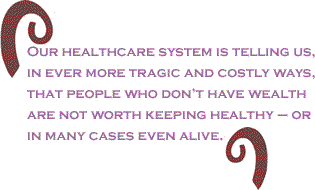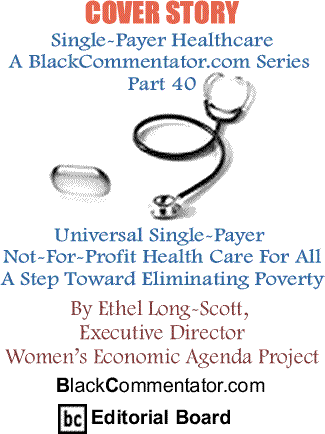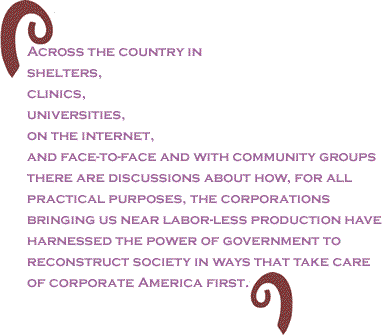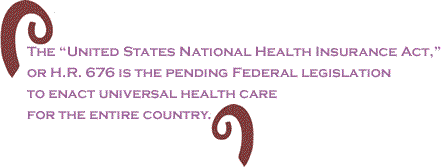
|
|||||||||||||||||||||||

Custom Search
|
|
 |
|
The statistical warnings of a health care system in meltdown are flooding in from all corners of the country. More than 48 million Americans are without healthcare, and that number is exploding upwards as our shrinking economy sheds the jobs that our health care is supposed to be based on – more than half a million in November alone, nearly 2 million in 11 months. And it isn’t just a problem of being uninsured: a new study shows that it is people with insurance and doctors - not the uninsured - who account for 85% of super-expensive emergency room visits because they cannot get appointments with their doctors, cannot get regular hospital beds, or did not seek early care because their insurance didn’t cover enough of the costs. Our healthcare system is telling us, in ever more tragic and costly ways, that people who don’t have wealth are not worth keeping healthy – or in many cases even alive. As the recession engulfs more and more people, it is increasingly clear that the battle for quality healthcare for all – a human right – cannot be separated from the broader struggle to eliminate poverty. Even as more Americans face homelessness every year through foreclosures and rising layoffs; as food pantries are overwhelmed and more people go to bed hungry, as more seniors are denied medicines, as more businesses shut down, we watch the continuing saga of poor people bailing out the rich through taxpayer-funded government corporate rescue programs. This is a time when the soul of America, a nation that values the pursuit of life, liberty and happiness, is at stake. It is foolish, wrong and immoral to keep trying to patch together a system that has proved increasingly inadequate for more than a generation, no matter how much tinkering has been tried. It is time for a solution that looks forward to the economic, social and human realities of the next decade, rather than backward to a past that can no longer be re-created. The old days of millions of industrial jobs with wages that lifted entire families out of poverty and benefits that took care of health and retirement are gone. They are casualties of the forces of computer-controlled manufacturing and globalization that have redefined how much our society needs human labor and is willing to pay for it. Across the country in shelters, clinics, universities, on the internet, and face-to-face and with community groups there are discussions about how, for all practical purposes, the corporations bringing us near labor-less production have harnessed the power of government to reconstruct society in ways that take care of corporate America first. They don’t care whether workers live or die. Their campaign contributions are guaranteeing that corporations end up with the wealth, and we, the people, are still scrambling to survive. What is going to be done to guarantee food, clothing, housing, health care, energy, education, transportation and the other necessities of modern life for the workers the corporations are no longer willing to hire? Universal single-payer, not-for-profit health care for all is an important piece of the answer. The “United States National Health Insurance Act,” or H.R. 676 is the pending Federal legislation to enact universal health care for the entire country. HR. 676 would provide universal health insurance coverage for all individuals residing in the United States and its territories. H.R. 676 would create a single payer, not-for-profit health care system, improving access to care for ALL, eliminating covered benefit health care costs for individuals. It would provide this much-improved health care for all at less total cost than we pay now for our grievously inadequate health care system.
Unfortunately, we may not be able to get all the way to HR. 676 without some interim steps. The health care corporations that make their money from sick people having to purchase their expensive products will stop at nothing to squeeze more profits out of the health care field - even when that means closing hospitals, raising premiums, pressuring the government for huge tax breaks, pursuing patients well into bankruptcy – and even refusing to supply critically needed medicines to people who are not wealthy enough to pay. These corporations are supported by many of our leaders who see their mission as taking government out of the business of caring for its people. California is especially hard hit. Our state enters 2009 with a budget that would require destitute Californians to pay premiums for Medi-Cal (California’s version of Medicare), and drastically cut money to seniors and CalWORKS recipients. There is also the possibility of another major strike of grocery workers in Northern California attempting to prevent cuts to their healthcare. That is also why we also support in full the successfully passed One Plan, One Nation legislation from New Jersey (ASSEMBLY RESOLUTION No. 163) New Jersey is a state similar to California and many others in facing huge budget deficits. The One Plan, One Nation legislation, authored by New Jersey’s Industrial Union Council president Ray Stever, memorializes Congress and the President to enact H.R. 676, the “United States National Health Insurance Act.” H.R. 676 would create a single payer, not-for-profit health care system, guaranteeing access to care for ALL and eliminating covered benefit health care costs for individuals.
In this context, no issue is more important than the battle for our people’s health as an integral part of the fight for poverty elimination. We have to take health care out of the market economy, because the market economy is destroying itself in its zeal to drive the costs of production, including labor, as low as possible – and it is destroying everything that depends on it. That problem is not going to be fixed by continuing to bail out the speculators. That is why the Women’s Economic Agenda Project (WEAP) together with partners like the Poor People’s Economic Human Rights Campaign struggles to build a broad base of poor and working people fighting in unison for all of our economic human rights. We see that no progress has ever been made without a concerted and forceful people’s movement to win and protect that progress. We work to build across color lines, poor people’s and worker - led organizations working together with trade unions, community groups and people of low or no income to develop diverse and inclusive methods for elevating our cause. Once unleashed, the American people can accomplish great things - abolishing slavery, overthrowing colonial rule, winning suffrage for women and African Americans. Unleashing that potential is what we all must be about. Too many people suffer every day in this rich, rich nation. We accept no less than our government owning up to its responsibility to our people. Single Payer Universal healthcare for all is a key step toward doing that! Click here to read any of the articles in this special BC series on Single-Payer Healthcare. BlackCommentator.com Editorial Board member, Ethel Long - Scott, is the Executive Director of the Women's Economic Agenda Project, (WEAP). For nearly 40 years, Ethel Long - Scott has been on a mission to increase social and economic justice in jobs as varied as non - profit executive director, grassroots community organizer and political campaign strategist. Often that has meant working with labor and community groups to create opportunities for constructive social change where none seemed to exist. Always that has meant community organizing at a grassroots level to help ordinary people amplify their voices by teaming up with each other. She is known nationally and internationally for devoting her life to the education and leadership of people at the losing end of society, especially women of color. She is dedicated to economic security and justice and believes that the US is engaged in a relentless war against workers and the poor. Click here to contact Ms. Long - Scott. |
|
Any BlackCommentator.com article may be re-printed so long as it is re-printed in its entirety and full credit given to the author and www.BlackCommentator.com. If the re-print is on the Internet we additionally request a link back to the original piece on our Website. Your comments are always welcome. eMail re-print notice
If you send us an eMail message we may publish all or part of it, unless you tell us it is not for publication. You may also request that we withhold your name. Thank you very much for your readership. |
|
| |
|
| January
8, 2009 Issue 306 |
|
| Executive Editor: Bill Fletcher, Jr. |
| Managing Editor: Nancy Littlefield |
| Publisher: Peter Gamble |
| Est. April 5, 2002 |
Printer Friendly Version
in resizeable plain
text format or pdf
format. |
| Frequently Asked Questions |
 |

|
 |
 |
 |
| |
| |







































